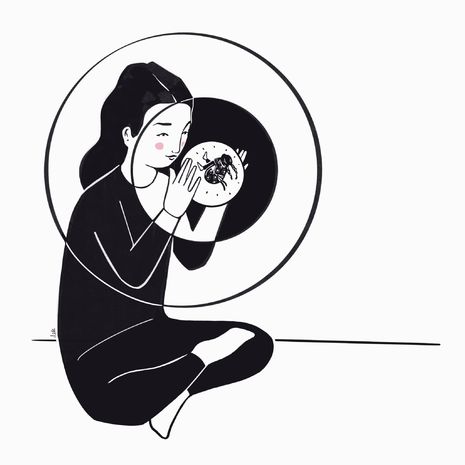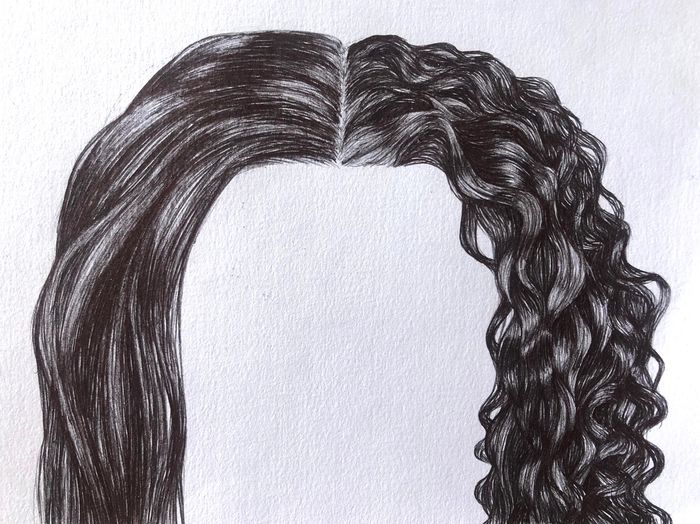Growing up Asian in a White Household
Anna Trowby reflects on her complex experience of growing up Asian in a white household and what it has taught her about herself

Growing up, I always felt like the odd one out. I have now realised that my quirky personality naturally inclines me towards being a little ‘odd’ and that this is not something to be ashamed of. However, lately I have been reflecting on the interaction between my biracialism and my own alienation - I now wonder if I am seen as odd because I am marked out in a specifically racialised way. Looking back, my alienation makes sense in the context of my turbulent childhood spent living in the gap between two cultures, neither of which knew entirely what to do with me. Exploring this experience has made me consider how I was affected by growing up Asian in a white household.
My formative years were spent living with the white side of my family, and despite their efforts, I struggled to feel like I belonged with them. It is important to note that I have received unwavering support from members of my white family. My dad and grandmother have done everything they can to support me and encourage me to be proud of my heritage. They also fought ardently for me when they found out that I was receiving racist abuse from children at school, and I will always be grateful to them for that. But, despite this, there were certain things that were difficult for us to talk about. My family did not really know how to approach the issue of race with me. Asian culture was completely alien to them, so it was never discussed except in superficial terms (Chinese takeaway, anyone?).
“My family did not really know how to approach the issue of race with me. Asian culture was completely alien to them, so it was never discussed except in superficial terms (Chinese takeaway, anyone?)”
The fact that some of my family didn’t even seem to know my race was also problematic. For a long time, I switched between calling myself Chinese and Mongolian when introducing myself to others, because I grew up thinking these terms were interchangeable. I only recently realised the specificity of my indigenous Mongolian heritage, and I have done what I can to trace the history of myself back to my ancestors, but it feels like the damage has already been done. For example, I still have family members that will refer to me as Chinese and I’m wary of correcting them, mostly because I don’t want to embarrass them. Though I have a better dialogue with my dad, who is an academic in Chinese studies and is very well versed in East Asian history, traditions and culture, unfortunately even with him I could not really talk about my specific experiences of growing up Asian.
Often, mixed-race children rely on particular family members to talk through experiences that are specific to their ethnicity. In my early childhood, it was my mother who would take me to Chinatown and family gatherings, but unfortunately the development of mental health illnesses meant that she could no longer look after me, and I was sent to live with my white grandparents who could not expose me to the same cultural things that my mother did. Since becoming estranged from my mother, I have not had anyone that I can talk to intimately about my heritage, which is sadly an experience that some mixed-race individuals share.
Retrospectively, I realise that I could have spoken to my close Asian friends at school about my alienation, but many of us were ashamed of our immigrant backgrounds. We consequently did everything we could to fit in and conceal these ‘embarrassments’. Aside from the occasional joke levied at our ‘weird’ immigrant families, none of us felt that comfortable sharing our intimate and complex experiences of being Asian in British society, especially as we were afraid of alienating our white friends and exposing our vulnerabilities. I’m regretful that we were unable to talk more freely about our experiences as Asian girls. However, since then, at university I have felt more confident to talk about my own identity as I have been surrounded by a larger Asian community and can explore Asian culture in more detail.
“My experiences have taught me to be emboldened in my individuality and to embrace whatever I am, in all the forms, shapes and shades of myself, for better and for worse.”
However, I am not sure that these issues would have been resolved by growing up with my Asian family. While I do not feel that I came into my own as an Asian woman with my white family, I would have struggled with the same alienation had I grown up with my mother. As she got older, my mother grew more detached from discussing our family history and heritage with me. I cannot say why this happened, but it may have stemmed from her family’s own history of surviving genocide in Inner Mongolia. Whenever I saw them, my mother’s family were also reserved about discussing their identity with me, especially given that it was an identity that they had been systematically persecuted and murdered for during the cultural revolution. It also didn’t help that, to them, I was a ‘half-blood’ relative who didn’t ‘get’ their problems. While I am sympathetic to this position now that I know more about their history, it did hurt at the time to always be treated as the exotic ‘English’ cousin and never a Mongolian in my own right.
Because of the unique circumstances of my family, I believe that I would have struggled to come to terms with my identity even if I was brought up by my mother. However, despite the problems I encountered growing up without full access to who I am, my upbringing has empowered me to define my own identity. My experiences have taught me to be emboldened in my individuality and to embrace whatever I am, in all the forms, shapes and shades of myself, for better and for worse.
 News / Hundreds of Cambridge academics demand vote on fate of vet course20 February 2026
News / Hundreds of Cambridge academics demand vote on fate of vet course20 February 2026 News / University Council rescinds University Centre membership20 February 2026
News / University Council rescinds University Centre membership20 February 2026 News / Judge Business School advisor resigns over Epstein and Andrew links18 February 2026
News / Judge Business School advisor resigns over Epstein and Andrew links18 February 2026 News / Petition demands University reverse decision on vegan menu20 February 2026
News / Petition demands University reverse decision on vegan menu20 February 2026 News / Caius students fail to pass Pride flag proposal20 February 2026
News / Caius students fail to pass Pride flag proposal20 February 2026










